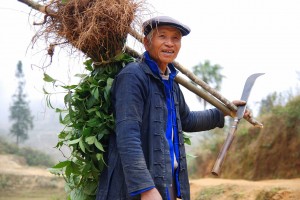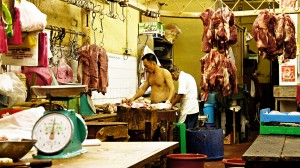By Ashley Cookey-Gam, Katherine Crosby, and Nick Shaw
Organic farming and food safety in China go hand in hand when dealing with the production, processes, and manufacturing of food. Traditional Chinese farming definitely has its faults due to the lack of strict food regulations. Often times “…many of them (manufacturers) are out to make a quick buck regardless of public health…” (Ang 2012: 215) The lack of carefulness leads to the continuous problems in food safety because the manufacturing is not always in the best conditions in terms of sanitation. [Link: Difficulties of Organic Farming]
Audra Ang’s book To the People, Food is Heaven: Stories of Food and Life in a Changing China gives several accounts about what goes on in the production of food in China. One instance occurred when Ang tried to observe a family-owned noodle business. She witnessed a worker not exercising proper hygiene as he “…picked his nose and used the same hand to pack a bag (of noodles).” (Ang 2012: 215) Many people have no idea how their food is treated or prepared; they simply just partake in the consumption aspect of the food without realizing what they are actually putting into their bodies. “…eating in China was a little like playing Russian roulette with food.” (Ang 2012: 215)
“Yuanyang hani farmer” by “Takeaway” is licensed under Attribution-Share Alike 3.0 Unported
As seen in other parts of the world, so many unnatural additives are involved with farming in China. “…beans treated with banned pesticides, cooking oil recycled from gutters…watermelons exploding after being boosted by growth accelerators, and pork passed off as beef after being soaked in a detergent additive” (Ang 2012: 215) are just a few examples. In addition to the dangerous substances being used with the food, loyalty and trustworthiness between farmers and their customers are broken as farmers may not be completely honest about how their food is being produced. Therefore, it is very imperative to remember that “For food, safety is all-important.”
To help ensure food safety, organic farming was introduced to China in 1990. [Link: Chinese Organic Farming Introduction] “Since then, the movement has gained momentum, fueled by a growing network of young and educated Chinese who are joining or starting organic farms in an effort to control what goes into their bodies in the wake of tainted food scandals.” (Ang 2012: 215) The amount of organic farms in China increased during the 2005-2006 time frame. During this year the amount of organic farmland went from 740,000 acres to approximately 8.6 million acres.
“Raw Pork Meat in Bloody Butchery of Corpses” by epsos.de licensed under CC BY 2.0
China has come a long way in the farming realm. It has established more regulations to better the quality and safety of food production. The true problem lies with making sure that those standards are carried through across the board. Overall, China’s organic farming system is thriving and continues to improve as well as appeal to a broader group of people.
Bibliography
Audra Ang, To the People, Food Is Heaven: Stories of Food and Life in a Changing China (Guilford: Lyons, 2012), 215.
See also:
Chinese Organic Farming: Introduction
Chinese Organic Farming: Difficulties Encountered by Organic Farmers


